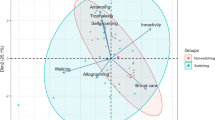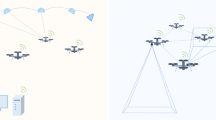Abstract
Task allocation, and task switching have an important effect on the efficiency of distributed, locally controlled systems such as social insect colonies. Both efficiency and workload distribution are global features of the system which are not directly accessible to workers and can only be sampled locally by an individual in a distributed system. To investigate how the cost of task switching affects global performance we use social wasp societies as a metaphor to construct a simple model system with four interconnected tasks. Our goal is not the accurate description of the behavior of a given species, but to seek general conclusions on the effect of noise and time delay on a behavior that is partitioned into subtasks. In our model a nest structure needs to be constructed by the cooperation of individuals that carry out different tasks: builders, pulp and water foragers, and individuals storing water. We report a simulation study based on a model using delay-differential equations to analyze the trade-off between task switching costs and keeping a high degree of adaptivity in a dynamic, noisy environment. Combining the methods of time-delayed equations and stochastic processes we are able to represent the influence of swarm size and task switching sensitivity. We find that the system is stable for reasonable choices of parameters but shows oscillations for extreme choices of parameters and we find that the system is resilient to perturbations. We identify a trade-off between reaching equilibria of high performance and having short transients.








Similar content being viewed by others
References
Anderson, C., Boomsma, J. J., & Bartholdi, J. J. (2002). Task partitioning in insect societies: bucket brigades. Insectes Soc., 49, 171–180.
Anderson, C., & Ratnieks, F. L. W. (1999a). Task partitioning in foraging: general principles, efficiency and information reliability of queueing delays. In C. Detrain, J.-L. Deneubourg, & J. M. Pasteels (Eds.), Information processing in social insects (pp. 31–50). Basel: Birkhäuser.
Anderson, C., & Ratnieks, F. L. W. (1999b). Task partitioning in insect societies. I. Effect of colony size on queueing delay and colony ergonomic efficiency. Am. Nat., 154, 521–535.
Anderson, C., & Ratnieks, F. L. W. (2000). Task partitioning in insect societies: novel situations. Insectes Soc., 47(2), 198–199.
Bannister, J. A., & Trivedi, K. S. (1983). Task allocation in fault-tolerant distributed systems. Acta Inform., 20, 261–281.
de Weerdt, M., Zhang, Y., & Klos, T. (2007). Distributed task allocation in social networks. In Proceedings of the 6th international joint conference on autonomous agents and multiagent systems, New York: ACM.
Deneubourg, J.-L., & Goss, S. (1989). Collective patterns and decision-making. Ethol. Ecol. Evol., 1(4), 295–311.
Gerkey, B. P., & Matarić, M. J. (2004). A formal analysis and taxonomy of task allocation in multi-robot systems. Int. J. Robot. Res., 23(9), 939–954.
Gordon, D. M. (1996). The organization of work in social insect colonies. Nature, 380, 121–124.
Hamann, H., Meyer, B., Schmickl, T., & Crailsheim, K. (2010). A model of symmetry breaking in collective decision-making. In S. Doncieux, B. Girard, A. Guillot, J. Hallam, J.-A. Meyer, & J.-B. Mouret (Eds.), Lecture notes in artificial intelligence: Vol. 6226. From animals to animats 11 (pp. 639–648). Berlin: Springer.
Hamann, H., Schmickl, T., Wörn, H., & Crailsheim, K. (2012). Analysis of emergent symmetry breaking in collective decision making. Neural Comput. Appl., 21(2), 207–218.
Hirsh, A. E., & Gordon, D. M. (2001). Distributed problem solving in social insects. Ann. Math. Artif. Intell., 31(1–4), 199–221.
Hölldobler, B., & Wilson, E. O. (2008). The superorganism: the beauty, elegance, and strangeness of insect societies. New York: Norton.
Jeanne, R. L. (1986). The organization of work in polybia occidentalis: costs and benefits of specialization in a social wasp. Behav. Ecol. Sociobiol., 19, 333–341.
Jeanne, R. L. (1996). Regulation of nest construction behaviour in polybia occidentalis. Anim. Behav., 52, 473–488.
Karsai, I., & Balazsi, G. (2002). Organization of work via a natural substance: Regulation of nest construction in social wasps. J. Theor. Biol., 218(4), 549–565.
Karsai, I., & Runciman, A. (2009). The effectiveness of the “common stomach” in the regulation of behavior of the swarm. In I. Troch & F. Breitenecker (Eds.), 6th Vienna international conference on mathematical modelling, MATHMOD 2009 (pp. 851–857). Vienna: ARGESIM Publishing House.
Karsai, I., & Schmickl, T. (2011). Regulation of task partitioning by a “common stomach”: a model of nest construction in social wasps. Behav. Ecol., 22, 819–830.
Karsai, I., & Wenzel, J. W. (1998). Productivity, individual-level and colony-level flexibility, and organization of work as consequences of colony size. Proc. Natl. Acad. Sci. USA, 95, 8665–8669.
Karsai, I., & Wenzel, J. W. (2000). Organization and regulation of nest construction behavior in metapolybia wasps. J. Insect Behav., 13, 111–140.
Klügl, F., Triebig, C., & Dornhaus, A. (2003). Studying task allocation mechanisms of social insects for engineering multi-agent systems. In 2nd international workshop on the mathematics and algorithms of social Insects, Atlanta, GA, USA.
Kuang, Y. (1993). Delay differential equations: with applications in population dynamics. Boston: Academic Press.
Lemaire, T., Alami, R., & Lacroix, S. (2004). A distributed tasks allocation scheme in multi-UAV context. In Proc. of the IEEE international conference on robotics and automation (ICRA’04) (Vol. 4, pp. 3622–3627). New York: IEEE Press.
Lerman, K., Jones, C., Galstyan, A., & Matarić, M. J. (2006). Analysis of dynamic task allocation in multi-robot systems. Int. J. Robot. Res., 25(3), 225–241.
Longtin, A., Milton, J. G., Bos, J. E., & Mackey, M. C. (1990). Noise and critical behavior of the pupil light reflex at oscillation onset. Phys. Rev. A, 41, 6992–7005.
Nair, R., Ito, T., Tambe, M., & Marsella, S. (2002). Task allocation in the RoboCup rescue simulation domain: a short note. In A. Birk, S. Coradeschi, & S. Tadokoro (Eds.), RoboCup 2001: robot soccer world cup V (Vol. 2377, pp. 1–22). Berlin: Springer.
Ratnieks, F. L. W., & Anderson, C. (1999). Task partitioning in insect societies. Insectes Soc., 46(2), 95–108.
Schmickl, T., & Crailsheim, K. (2004). Costs of environmental fluctuations an benefits of dynamic foraging decisions in honey bees. Adapt. Behav., 12, 263–277.
Schmickl, T., & Crailsheim, K. (2008). Taskselsim: a model of the self-organization of the division of labour in honeybees. Math. Comput. Model. Dyn. Syst., 14, 101–125.
Seeley, T. D. (1982). Adaptive significance of the age polyethism schedule in honeybee colonies. Behav. Ecol. Sociobiol., 11, 287–293.
Seeley, T. D. (1985). The information-center strategy of honeybee foraging. Fortschr. Zool., 31, 75–90.
Seeley, T. D., Camazine, S., & Sneyd, J. (1991). Collective decision-making in honey bees: how colonies choose among nectar sources. Behav. Ecol. Sociobiol., 28(4), 277–290.
Sinha, N., Brown, J. T. G., & Carpenter, R. H. S. (2006). Task switching as a two-stage decision process. J. Neurophysiol., 95, 3146–3153.
Thenius, R., Schmickl, T., & Crailsheim, K. (2008). Optimisation of a honeybee-colony’s energetics via social learning based on queuing delays. Connect. Sci., 20(2), 193–210.
Wenzel, J. W., & Pickering, J. P. (1991). Cooperative foraging, productivity, and the central limit theorem. Proc. Natl. Acad. Sci. USA, 88, 36–38.
Acknowledgements
We thank the anonymous reviewers for precise comments that helped to improve the manuscript significantly. Authors T. Schmickl and H. Hamann were supported by the following grants: EU-IST-FET project ‘SYMBRION’, no. 216342; EU-ICT project ‘REPLICATOR’, no. 216240. T. Schmickl was also supported by the following grants: EU-ICT ‘CoCoRo’, no. 270382; EU-ICT ‘ASSISIbf’, no. 601074; Austrian Science Fund (FWF) research grant P23943-N13 (REBODIMENT). The authors thank Wayne G. Basler for establishing the Chair of Excellence for the Integration of the Arts, Rhetoric and Science and East Tennessee State University for supporting T. Schmickl as Basler Chair and I. Karsai as Basler Host 2012. I. Karsai was supported by 12-005M RDC and E82141 grants from ETSU.
Author information
Authors and Affiliations
Corresponding author
Rights and permissions
About this article
Cite this article
Hamann, H., Karsai, I. & Schmickl, T. Time Delay Implies Cost on Task Switching: A Model to Investigate the Efficiency of Task Partitioning. Bull Math Biol 75, 1181–1206 (2013). https://doi.org/10.1007/s11538-013-9851-4
Received:
Accepted:
Published:
Issue Date:
DOI: https://doi.org/10.1007/s11538-013-9851-4




